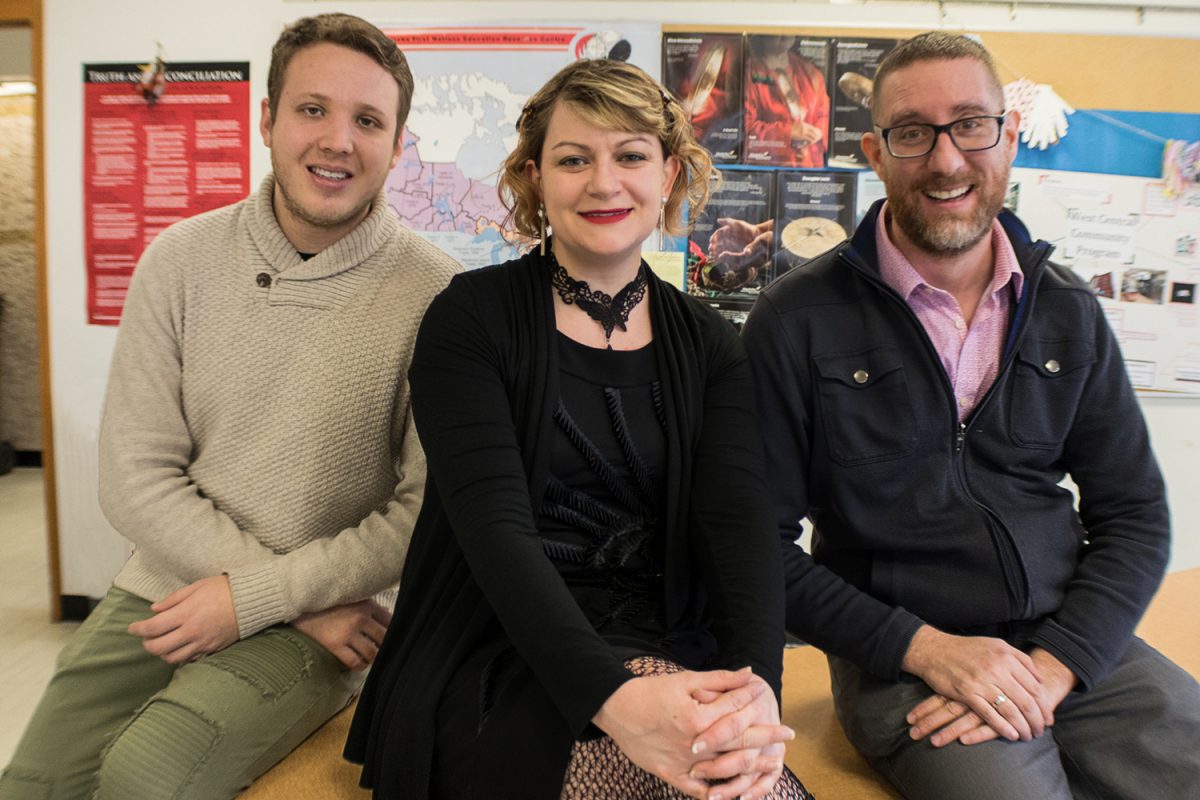
Research assistant Gustavo Moura, Prof. Clea Schmidt, and Assistant Prof. Robert Mizzi are researching the experiences of LGTBQ teachers overseas.
Researching LGBTQ teacher experiences overseas
Having taught in four countries, Assistant Professor Robert Mizzi knows firsthand the kinds of discrimination LGTBQ educators can face overseas.
For example, he recalls working in Kosovo as a mentor to a group of teachers, quickly developing an engaging rapport and a collegial friendship with one of them.
“(He was) a phenomenal instructor, really engaged. He got his kids really active,” Mizzi said, adding the relationship changed dramatically during the next workshop.
“He was talking to someone, so I touched his shoulder to get his attention, and asked him how things were going,” Mizzi said.
The teacher recoiled, responding: “Don’t touch me.”
“There were a lot of stunned faces around the table as to why he said that.”
The teacher didn’t offer any explanation, but at the time, Mizzi was also working with a local LGBTQ group to establish a community space, “and I wondered if something had filtered out about that work,” Mizzi said.
It’s because of these experiences like this that Mizzi and Professor Clea Schmidt are recruiting volunteers for a study documenting and researching the experiences of LGTBQ teachers in countries with systemic and social homophobia.
“We want to see how an LGTBQ person can navigate these different systems and still have a level of safety, inclusion and self-esteem while still contributing meaningfully to the teaching force,” says Mizzi, noting the project stems from his studies of LGBTQ educators, and those working overseas. “This newer project looks at the border-crossing behaviours and experiences … as they go into a non-Western country.”
Mizzi and Schmidt expect recommendations arising from the study can inform LGTBQ educators as well as enable overseas education policymakers and administrators to create welcoming environments for their employees.
Despite progress in countries worldwide, homosexuality remains criminalized in 72 countries, sometimes resulting in imprisonment. And in 12 countries, homosexuals can face the death penalty.
“It’s a stunning number, and yet the research shows that those laws aren’t stopping people from going overseas. They’re just learning how to navigate that system—perhaps intuitively or perhaps purposefully,” Mizzi said, pointing to questions the study will address. “Is it just a matter of coming out to close friends, in certain social pockets, or are they more welcomed?
“How you make your way in the world and still have a successful teaching experience?” Mizzi said.
Schmidt, a longtime researcher of internationally educated teachers and teacher workforce diversity, says the research partners see the study contributing significantly to existing scholarship on the teaching profession worldwide. Additionally the research is expected to insights into the literature on teaching English as a second and foreign language, “as we anticipate that some of our participants will be in English-teaching contexts overseas,” Schmidt says.
As part of the study, called Out There, Schmidt and Mizzi propose creative and innovative research methods and ways to share the findings at the end of the project.
Participants in the research project will receive a camera to photograph public spaces relevant to them as LGTBQ persons while crossing borders into other countries. Researchers will then follow up with the volunteers to discuss the significance of the images and the locations photographed.
To promote the project once it’s completed, the photos will be showcased in an art-gallery exhibit, “so that the public can engage with the findings,” Schmidt said.
Mizzi and Schmidt encourage educators who are interested in participating in the study to contact them at outthereresearch.ca/
Mizzi’s account of his experience working as an LGTBQ educator in Kosovo published in February in Routledge Handbook of Queer Development Studies.






